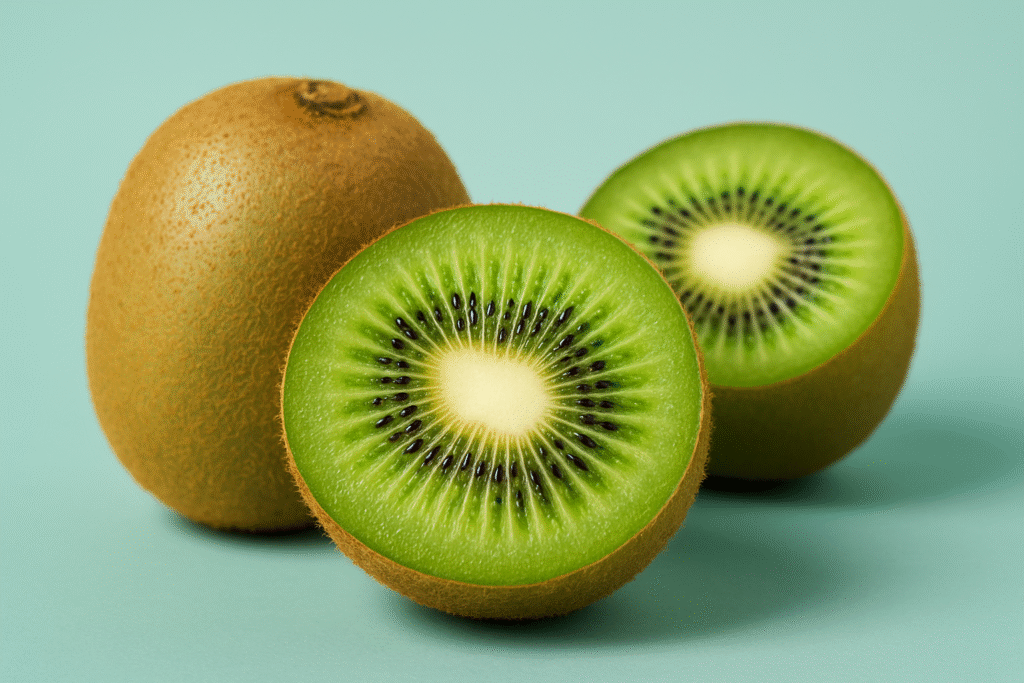Not all superfoods come in big packages — sometimes, the most powerful ones are small, green, and bursting with tangy sweetness. Enter the kiwi fruit (Actinidia deliciosa). Famous for its emerald-green flesh, crunchy seeds, and refreshing flavor, kiwi is much more than a snack — it’s a nutritional powerhouse packed with vitamins, minerals, antioxidants, and fiber.
The World Health Organization (WHO) emphasizes eating a wide variety of fruits and vegetables daily to reduce the risk of chronic illnesses such as diabetes, heart disease, and cancer. Kiwi fruit, with its exceptional nutrient profile, is perfectly aligned with this recommendation.
In this article, we’ll explore the fascinating history of kiwi, its nutrient-rich profile, top health benefits, disease-preventive properties, and creative ways to add it to your diet.
Origins and Varieties of Kiwi Fruit
Kiwi’s journey begins in China, where it was once known as the “Chinese gooseberry.” In the early 20th century, it was introduced to New Zealand. Farmers renamed it “kiwi” after their national bird — and the name has stuck ever since.
Popular Kiwi Varieties
- Green Kiwi (Hayward): Tangy-sweet flavor, fuzzy brown skin.
- Gold Kiwi: Sweeter and smoother, with golden flesh and bronze skin.
- Baby Kiwi (Hardy Kiwi): Bite-sized, smooth-skinned, and edible whole.
Today, kiwi is cultivated around the world, with New Zealand, Italy, Greece, Chile, and China leading in production.
Kiwi Fruit Nutrition: Small Fruit, Big Impact
Kiwi proves that good things come in small packages. Despite its small size, it delivers an impressive range of essential nutrients.
Nutritional Value (per 100 g of kiwi fruit):
- Calories: 41–61
- Vitamin C: 92.7 mg (over 100% of daily requirement)
- Vitamin K: 40.3 mcg
- Vitamin E: 1.5 mg
- Fiber: 2.1 g
- Folate: 25 mcg
- Potassium: 312 mg
- Antioxidants: Lutein, zeaxanthin, flavonoids
Source: WHO & FAO Food Composition Database
Top Health Benefits of Kiwi Fruit
- Immunity Booster
Just one kiwi meets your daily vitamin C needs, strengthening immunity and protecting against infections. - Digestive Health
Kiwi contains actinidin, a natural enzyme that supports protein digestion. Combined with fiber, it aids digestion and prevents constipation. - Heart Protection
With potassium, fiber, and antioxidants, kiwi helps regulate blood pressure, lower bad cholesterol, and improve circulation. - Skin Radiance & Anti-Aging
Vitamin E and antioxidants fight free radicals, support collagen, and keep skin glowing and youthful. - Perfect for Weight Loss
Low in calories yet high in fiber, kiwi keeps you fuller for longer, helping with healthy weight management. - Eye Care
Rich in lutein and zeaxanthin, kiwi helps prevent age-related vision decline. - Healthy Pregnancy
Folate supports fetal brain and nervous system development — making kiwi a great choice for expectant mothers.
Kiwi and Disease Prevention
Research shows that fruits like kiwi can play a role in reducing chronic disease risks.
- Diabetes: Low glycemic index makes kiwi safe for moderate consumption.
- Cancer Prevention: Antioxidants reduce oxidative stress and DNA damage.
- Respiratory Health: Vitamin C-rich fruits like kiwi may ease asthma symptoms and reduce wheezing in children.
Creative Ways to Enjoy Kiwi Fruit
- Eat it fresh by scooping with a spoon.
- Blend into smoothies or fresh juices.
- Add to fruit salads or green salads for a tangy twist.
- Pair with yogurt, oatmeal, or desserts.
- Use as a garnish in summer drinks.
How to Buy and Store Kiwi
- Choosing: Pick firm kiwis that yield slightly to gentle pressure.
- Ripening: Store unripe kiwis at room temperature until soft.
- Storing: Keep ripe kiwis in the refrigerator for up to two weeks.
Kiwi in a Balanced Diet
The WHO recommends at least 400 g of fruits and vegetables daily. Adding 1–2 kiwis a day is a simple way to reach this target while enjoying diverse nutrients.
Side Effects & Precautions
While kiwi is safe for most people, some considerations include:
- Allergies: Possible itching, rashes, or swelling.
- High fiber content: Overeating may cause mild digestive issues.
- Vitamin K interaction: If on blood-thinning medication, consult your doctor.
Conclusion
Small, vibrant, and nutrient-dense — kiwi is a true superfood. From boosting immunity and protecting the heart to supporting skin, digestion, and pregnancy, it offers countless benefits backed by science and endorsed by health organizations like WHO.
Adding kiwi to your daily routine — whether in a smoothie, salad, or enjoyed fresh — is a delicious way to naturally enhance your health.
FAQs
1. How many kiwis should I eat daily?
1–2 kiwis a day are enough for health benefits.
2. Can diabetics eat kiwi fruit?
Yes, kiwi has a low glycemic index, making it safe in moderation.
3. Is kiwi good for weight loss?
Yes, it’s high in fiber and low in calories, making it a perfect snack.
4. Can pregnant women eat kiwi?
Yes, kiwi provides folate, which supports fetal development.
5. What’s the best time to eat kiwi?
Morning is ideal for maximum vitamin C absorption, but it can be enjoyed anytime.
Read our blog on – https://newsarmour.com/coconut-water-benefits/
References
- World Health Organization (WHO): Healthy diet recommendations
- Food and Agriculture Organization (FAO): Fruit nutrition composition
- National Center for Biotechnology Information (NCBI): Research on kiwi and human health
- New Zealand Kiwifruit Growers Inc.
You can access from here
World Health Organization – Healthy Diet Recommendations
Food and Agriculture Organization (FAO) – Food Composition Database
NCBI – Kiwi Fruit and Human Health
Harvard T.H. Chan School of Public Health – Fruits & Vegetables





